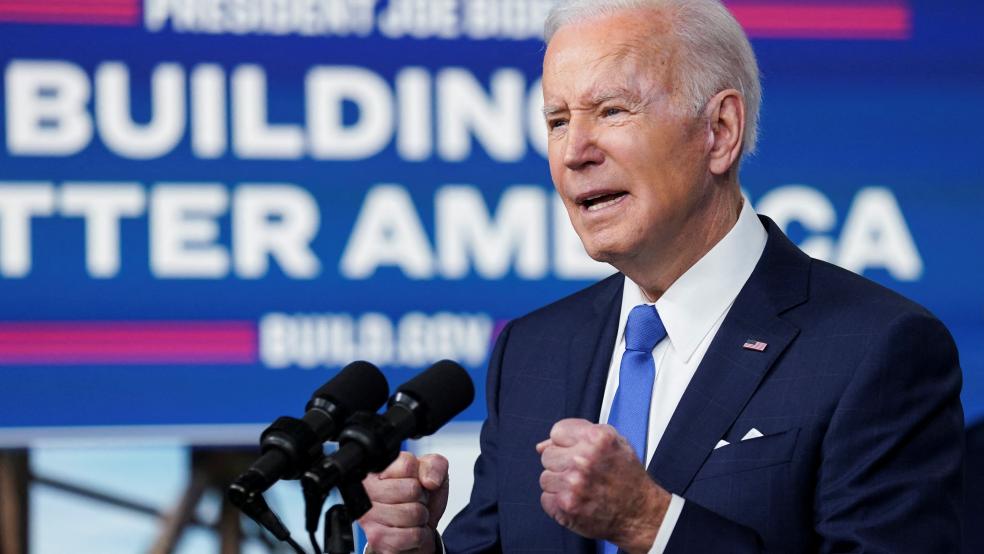Talks are reportedly heating up between Senate Majority Leader Chuck Schumer (D-NY) and Sen. Joe Manchin (D-WV) over a package of tax changes, health care reforms, and climate and energy programs.
“We’re hearing there’s no deal, at least not yet. But Schumer and Manchin are closer than they’ve ever been, according to multiple sources familiar with the negotiations,” Punchbowl News reported this morning, adding that climate policies remain a point of contention.
Roll Call’s Paul M. Krawzak reports that the package under discussion would raise about $1 trillion in new tax revenue, down from $1.5 trillion in earlier versions of the budget reconciliation bill. “[T]he lower revenue target could give Democrats fiscal space to drop big-ticket provisions like a proposed ‘surtax’ on multimillionaires and applying an existing investment income tax to profits earned by owners of ‘pass through’ firms that don’t face corporate taxes,” Krawzak notes. “Those proposals, estimated to generate about $480 billion, have raised concerns in the small-business community.”
The package would also include about $300 billion in savings from allowing Medicare to negotiate some drug prices.
The roughly $1.3 trillion to $1.4 trillion in new revenue and cost savings would imply some $700 billion may be available for new spending and tax breaks, given that Manchin has called for half of new revenues and savings to be used for deficit reduction.
Democrats are reportedly also looking to use the reconciliation bill address a potential spike in Affordable Care Act premiums. Manchin’s insistence on avoiding having new programs sunset early to keep their official cost down could result in a permanent expansion of the expanded ACA subsidies at a cost of around $220 billion over 10 years.
Reasons to remain skeptical: Democrats still face sizable obstacles to getting a budget reconciliation deal done. Krawzak reports that Sen. Kyrsten Sinema’s (D-AZ) support is still in question: “[S]ources speaking on condition of anonymity said the passage of time may not have increased Sinema’s fondness for the bill and she may have lingering concerns with some of the specific language.”
How we got here: In case you missed it, The Washington Post on Sunday published a lengthy, behind-the-scenes look at how negotiations between the White House and Sen. Joe Manchin (D-WV) on the roughly $2 trillion Build Back Better plan collapsed back in December.
Some substantive policy issues reportedly had yet to be resolved at the time Manchin blew up the Build Back Better talks, including differences over Democrats’ expanded Child Tax Credit, which expired at the end of last year. But the Post’s Jeff Stein and Tyler Pager report that, after months of talks and a seemingly productive meeting on December 14, Manchin became infuriated by a White House statement that mentioned him and only him as a negotiating partner, even after his office had asked that his name be removed or that Sinema’s name be added.
The statement did not slam Manchin or explicitly blame him for delaying the bill. It said, in part: “In these discussions, Senator Manchin has reiterated his support for Build Back Better funding at the level of the framework plan I announced in September.” But the senator reportedly felt the White House was trying to back him into a corner and had endangered him and his family, already the targets of liberal protests. He texted Steve Ricchetti, a top aide to Biden, saying “the statement you all put out tonight targeting me and my family was unconscionable and extremely dangerous. There will be no further negotiations.” Days later, Manchin told Fox News he couldn’t get to yes on the bill, effectively killing it.
“Biden aides are still in disbelief that Manchin abandoned months of painstaking negotiations, seemingly in an instant, over what they regarded as an innocent statement that they did not believe would offend the senator,” Stein and Pager report. “They are left wrestling with the question of how legislation of such historic dimensions appears to have been doomed by a simple miscommunication over a news release. Manchin’s allies do not understand why the White House would have done anything to needlessly provoke the key vote for their legislative aspirations and believe the administration had already ignored his demands for weeks.”
The bottom line: Any deal Democrats may reach is almost certainly going to be much narrower than the bill they were aiming for last year. “Democrats believed they were on the brink of ushering in changes on the order of Franklin D. Roosevelt’s New Deal,” Stein and Pager write. “They have only a few months to avoid facing voters without having enacted a single permanent new policy, outside of last year’s bipartisan infrastructure bill.”





